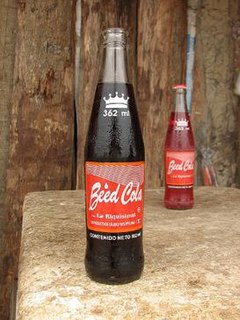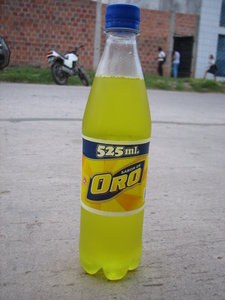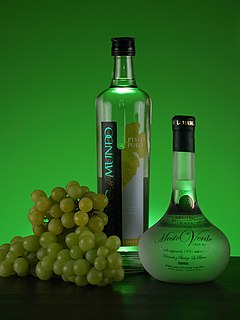 W
WBeed Cola is a Peruvian range of soft drinks trademarked on February 25, 2003 by Industria Embotelladora del Oriente S.R.L. Beed Cola is produced in Pucallpa, Peru and sold throughout the Ucayali Region. Beed Cola is sold in 362 ml glass bottles. The slogan for Beed Cola is "La Riquisima!".
 W
WCassinelli is a Peruvian range of soft drinks. Cassinelli is a brand of the Enrique Cassinelli and Sons company in Trujillo, Peru, and is sold in glass bottles of 296 ml and in PET bottles of 296 ml, 510 ml, 1.5 litre, 1.75 litre and 3.020 litre.
 W
WChicha morada is a beverage originated in the Andean regions of Perú but is actually consumed at a national level.
 W
WConcordia is a Peruvian range of soft drinks, first sold and produced in the "Norte Chico" region of Peru. Concordia can be found in flavors like Strawberry, Pineapple and Orange. Discontinued flavors include Apple and Non-alcoholic Champagne. Concordia was the first bottling plant in Peru to have a PET bottle blowing machine, installed in 1992. Concordia is now a brand of the PepsiCo company.
 W
WArca Continental Lindley S.A. is a 100-year-old Peruvian company, listed on the Lima Stock Exchange as CORLINI1, involved in the manufacturing, distribution and marketing of nonalcoholic beverages and the official bottler and distributor of all Coca-Cola products in Peru. The Lindley Corporation is best known for its creation and marketing of Inca Kola, the number one selling soft drink in Peru. The Lindley Corporation, located in the historic District of Lima, Peru, is also a major promoter of plastic recycling programs in Peru. Its president is Johnny Lindley Suarez.
 W
WDiet Inca Cola is the diet version of the popular carbonated beverage, Inca Kola. The soda has only 2 calories for an 8 ounce container, compared to the original soda's 96 calories.
 W
WGuaraná Backus is a Peruvian guaraná beverage containing guarana fruit and is sold in PET bottles of 500 ml. In 2007 the drink had 5% of the soft drinks market, and was relaunched with a new bottle and label and a light version. A year later its sales had increased by 49%.
 W
WInca Kola is a soft drink that was created in Peru in 1935 by British immigrant Joseph Robinson Lindley. The soda has a sweet, fruity flavor that somewhat resembles its main ingredient, lemon verbena. Americans compare its flavor to bubblegum or cream soda. Sometimes categorized as a champagne cola, it has been described as "an acquired taste" whose "intense color alone is enough to drive away the uninitiated."
 W
WKola Escocesa which translates to "Scottish cola" is a Peruvian soft drink. It is a brand of the Yura company, located in town of Yura, not far from the city of Arequipa. The beverage has been produced since the 1950s, using mineral water from the company's own water source. It is sold in PET bottles of 440ml, 600 ml, and 1.5 litres. Bottles come in both plastic and glass. Plastic is available in all sizes and the bottles take the former of a clear plastic bottle with a red label. Glass bottles are a clear glass with writing directly on the bottle in a white color. Glass bottles are available in 600ml and 1.5L sizes. The soda can be hard to find outside of the city of Arequipa. The soda is also available in a light variant which has no sugar. Plastic bottles that are available in the light variant fade to white near the bottom of the red label. These bottles also have the word light on the label instead of clasica.
 W
WFanta Kola Inglesa is a Peruvian soft drink. It is red in color and cherry-strawberry flavor. Introduced in 1912, Kola Inglesa currently comes in several sizes including a 3-liter bottle and a 500ml bottle. The drink is popular across Peru as in some Latin American markets in the United States. The brand was first owned by Manuel A. Ventura, who created the drink for the Peruvian market. In 1971 the recipe was sold to Mr. Enrique Heredia Alarcón. It was during this time that the drink became highly popular among Peruvians. In 1997, following CEPSA's bankruptcy, the brand was sold to The Coca-Cola Company along with Agua San Luis. In 2013 the name changed to Fanta Kola Inglesa.
 W
WKola Real is one of the most popular brands of Ajegroup, a leader in the Latin American beverage market. Started by the Añañoz’s Family in Ayacucho, Peru on June 23, 1988, the company has grown and expanded not only in Peru, but also in Cuba, Ecuador, Dominican Republic, Venezuela, Costa Rica, El Salvador, Mexico, Colombia, Brazil, Nicaragua, Panama and Thailand. Kola Real is available in many flavours such as "revolution red" (strawberry), orange, pineapple, lime-lemon, "negra" and "dorada" . In Nigeria, Mexico, Costa Rica, Colombia, Panama, Venezuela, Ecuador, Indonesia and Thailand, Kola Real "negra" is known as Big Cola.
 W
WOro is a Peruvian brand of soft drink owned by the Ajegroup and sold in Perú, Ecuador and Venezuela. Oro is a rival product to Inca Kola sharing the same characteristics such as the yellow color. Oro is sold in PET bottles of 525 ml.
 W
WPersa is a Peruvian brand of bottled water owned by Rocío Torres García, CEO of Productos Persa in Iquitos, Peru. Persa is sold in PET bottles of 600 ml.
 W
WPerú Cola is a Peruvian range of soft drinks. Perú Cola is a brand of the Embotelladora Don Jorge S.A.C. company, a former bottler of Coca-Cola and later Inca Kola products. Perú Cola was introduced in Peru in 2002 after the take-over of Inca Kola by the Coca-Cola Company. Perú Cola is sold in glass bottles of 500 ml and PET bottles of 500 ml, 1.5 liter, 2.2 liter and 3.3 liter.
 W
WIn Peru, pisco is a "designation of origin" that is reserved for the alcoholic beverage belonging to a variety of grape aguardiente produced in Peru since the late 16th century. It is the typical destillate of this country, elaborated from fermented wine of certain grapes, whose value has crossed its borders, as evidenced by the records of shipments made through the port of Pisco to Europe and other parts of the Americas since the 17th century, places such as England, Spain, Portugal, Guatemala, Panama and United States, from the mid-19th century.
 W
WPulp is a brand of nectar introduced to the Peruvian market by the Ajegroup in 2004. Pulp is sold in glass bottles of 300 ml and cartons of 150 ml and one litre in the flavors durazno (peach), mango, and piña (pineapple).
 W
WBackus and Johnston is the largest brewery in Peru, part of Bavaria Brewery, which itself is part of the international AB InBev group. Its main brewery is located in the Ate District of Lima. Backus, as owner of almost all brands of beer available in Peru, enjoys a de facto monopoly over Peruvian beer consumption. Besides beer, Backus produces soft drinks and bottled water.
 W
WSporade is a Peruvian brand of sports drink owned by Ajegroup. Launched in 2004, it has successfully wrestled market share from Gatorade thanks to its lower price.
 W
WViva is a Peruvian brand of soft drink owned by Backus and Johnston and sold in Perú. Viva is a rival product to Inca Kola sharing the same characteristics such as the yellow color. Viva is sold in PET bottles of 500 mL.